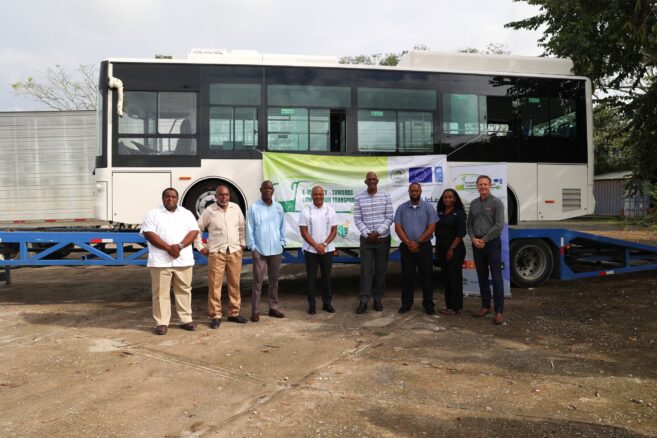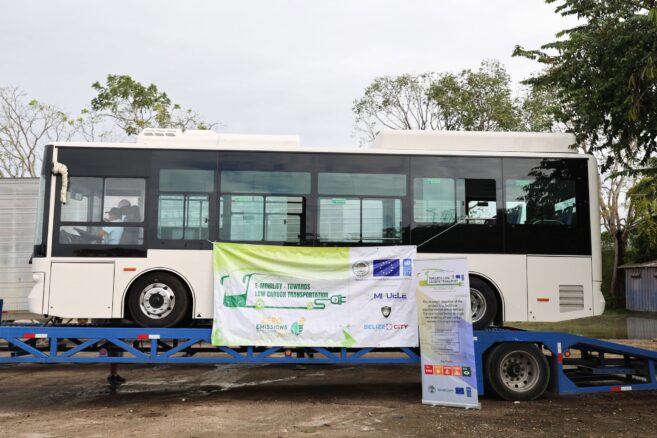Through the Electric Mobility Pilot Project, the first electric bus arrived at the Belize Western Border. Funded by the European Union (EU) and implemented in partnership with the United Nations Development Programme (UNDP), the Belize City Council (BCC), the Ministry of Public Utilities, Energy, Logistics, and E-Governance (MPUELE) and the Department of Transport (DoT), this is the first of five buses, with the second bus arriving later this week, that will be the foundation to support e-mobility expansion in the country.
“Through this pilot project, and with the support of the EU and UNDP, Belize is making tangible progress towards the Sustainable Development Goals’ (SDGs) global target of facilitating access to clean energy and promoting mechanisms for climate change by 2030,” said UNDP Deputy Resident Representative a.i., Ian King. “In addition to taking action to mitigate climate change, this initiative will also contribute to improving the quality of life of the Belizean people through upgrading of the commuting experience and improving the environmental quality of the transportation sector.”
The arrival of the first bus marked a milestone for the 4.5-million-euro pilot project (around 4.9 million USD): “Towards Low Carbon Transport: Piloting e-mobility within Belize’s Public Transport System” in achieving the goal of promoting universal access to affordable, reliable, and modern energy services and moving towards low carbon transportation.
“The arrival of the first ever electric bus in Belize signifies a transformative era in sustainable transportation,
powering the future of mobility,” commented Hon. Michel Chebat, Minister of the MPUELE. “Embracing electric mobility aligns with our energy policy’s commitment and illuminates our path toward an energy-efficient future. These buses are designated for intra-urban application and will be piloted within the public transportation system in Belize City with expected operation to take place before the end of the first quarter of 2024. The pilot programme serves in setting the conditions for the deployment and upscaling of electric mobility within Belize.”
Mayor Bernard Wagner of the BCC also shared, “With the arrival of the bus, Belize City continues stepping toward a more sustainable future. The introduction of these electric buses is more than a pilot project; it’s a testament to our dedication to upgrading lives by responsibly reducing greenhouse gasses and carbon emissions. I look forward to us all getting on board and riding this change together, paving the way for a cleaner, brighter tomorrow.”
To support the implementation of Belize’s contribution to the United Nations Framework Convention on Climate Change (UNFCC) and associated Low Emission Development Strategy (LEDs), the buses will provide improved air quality (zero emissions), reduced noise pollution, and lowered maintenance cost.
“The introduction of these electric buses marks the first step in the exploration of advancing the public transportation sector in Belize by embracing a modern and environmentally sustainable approach,” commented Leon FitzGerald Gentle, Chief Transport Officer of the DOT. “This includes wheelchair accessibility, on-board Wi-Fi access, and a camera monitoring system for the 50-passenger buses.”
Through collaboration among the UNDP, the Government of Belize, civil society organizations, and funding partners like the EU, this is a step forward to move Belize to a more climate- and eco-friendly country.
“The European Union continues its partnership with Belize to boost green and sustainable energy and transport solutions,” expressed Mirco Schröder, EU Programme Manager. “The EU looks forward to seeing the buses running on the Belizean roads, benefitting the people and the environment. The EU congratulates and thanks its partners for achieving a vital project step by bringing the buses into the country.”

Share
Read more

